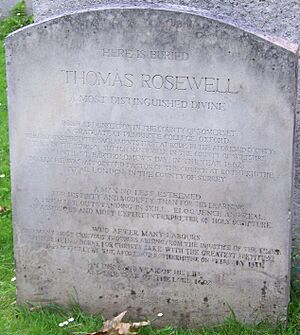Thomas Rosewell facts for kids
Thomas Rosewell (born May 3, 1630 – died February 14, 1692) was a Nonconformist minister from Rotherhithe, England. Nonconformists were Protestants who did not follow the official Church of England. Thomas Rosewell was found guilty of a serious crime called treason, but he was later pardoned by King Charles II.
Contents
Thomas Rosewell's Early Life
Thomas was born on May 3, 1630, in Dunkerton, a village in Somerset. He was the only son of Richard Rosewell and Grace Melborne. After his parents passed away, Thomas was raised by his uncle, James Rosewell. He went to King Edward's School, Bath to study.
In 1645, Thomas went to London to learn how to be a silk-weaver. However, in 1646, some relatives convinced his uncle that Thomas should study to become a minister instead. So, in 1648, Thomas went to Pembroke College at Oxford University. He earned his first degree in 1651.
Family and Ministry
His Wives and Children
Thomas Rosewell was married twice. His first wife was Susannah Strickland. They married on May 29, 1656. They had three daughters: Susannah, Elizabeth, and Margaret. Margaret later married a bookseller named John Lawrence. Susannah passed away in 1661.
In 1677, Thomas married Anne Godsalve, who was a widow. They had four children together: Susannah, Rhoda, Samuel, and Eliezer.
Working as a Preacher
In 1652, Thomas started working as a tutor for a family in Devon. The next year, in May 1653, he became the rector (a type of minister) at Rode, Somerset. He was officially ordained as a minister in 1654.
In 1657, he moved his ministry to Sutton Mandeville, Wiltshire, so his wife could be closer to her father. However, in 1662, a law called the Uniformity Act was passed. This law meant that ministers who did not follow the Church of England's rules were removed from their churches. Thomas Rosewell was one of these ministers.
After being removed, he worked as a chaplain and tutor for Lady Hungerford's family in 1663. In 1671, he had a period of mental illness. He recovered by early 1674.
Thomas Rosewell also wrote two books. One was called An Answer unto Thirty Questions Propounded by the Quakers (1656). The other was The Causes and Cure of the Pestilence (1665).
On May 5, 1674, he was chosen to be the Nonconformist minister at Rotherhithe, Surrey.
The Treason Trial
Thomas Rosewell became famous because of a very dramatic trial in 1684. He was accused of a serious crime called high treason. This meant he was accused of trying to harm the king or the government.
The accusation came from a sermon he preached on September 14, 1684. It was claimed he said that "we have had two wicked kings now together who have suffered popery to be introduced under their noses..." He was arrested on September 18 and put on trial in Westminster Hall. The judge was known as "Hanging" Judge Jeffries, who was very strict.
The charge against Thomas Rosewell seemed very unfair. It did not match his character or his beliefs. Thomas defended himself in court. He argued about the exact words he used, saying they were different from what was written in the official Latin charges.
Three women, who were not very trustworthy, gave evidence against him. One of them even admitted she had been paid to gather information. It's unclear if they lied or just misunderstood what he said. Even though many other witnesses spoke up for Thomas, the jury, guided by Judge Jeffreys, found him guilty of treason. The punishment for treason was death.
However, Thomas Rosewell was not sentenced immediately. When he returned to court on November 24, he argued that the charges were not correctly translated from Latin to English. Judge Jeffreys allowed him to get a lawyer to help with this argument.
Thomas Rosewell's arrest and conviction shocked many people, both Nonconformists and members of the Church of England. On January 28, 1685, King Charles II gave him a pardon. The King was told that if Thomas Rosewell was allowed to die, no one would feel safe in their homes.
The details of this trial were recorded and are still studied today as an example of how jury trials should be conducted fairly.
Later Life and Passing
Thomas Rosewell passed away in Bermondsey, Surrey, on February 14, 1692. He was buried at Bunhill Fields in London, a famous burial ground for Nonconformists. Six ministers led his funeral service. Mathew Mead gave the funeral sermon.
His original gravestone had Latin writing. Later, a new stone was put up with an English translation. It says he was a "most distinguished divine" (a very respected minister). It also mentions his birthplace, his education at Oxford, and where he served as a minister. The inscription praises him for his "piety and modesty" and his skill as a preacher. It notes that he faced "many labours and most grievous troubles" but bore them with great strength for his beliefs. He died peacefully in 1692, at 62 years old.
 | Jackie Robinson |
 | Jack Johnson |
 | Althea Gibson |
 | Arthur Ashe |
 | Muhammad Ali |


